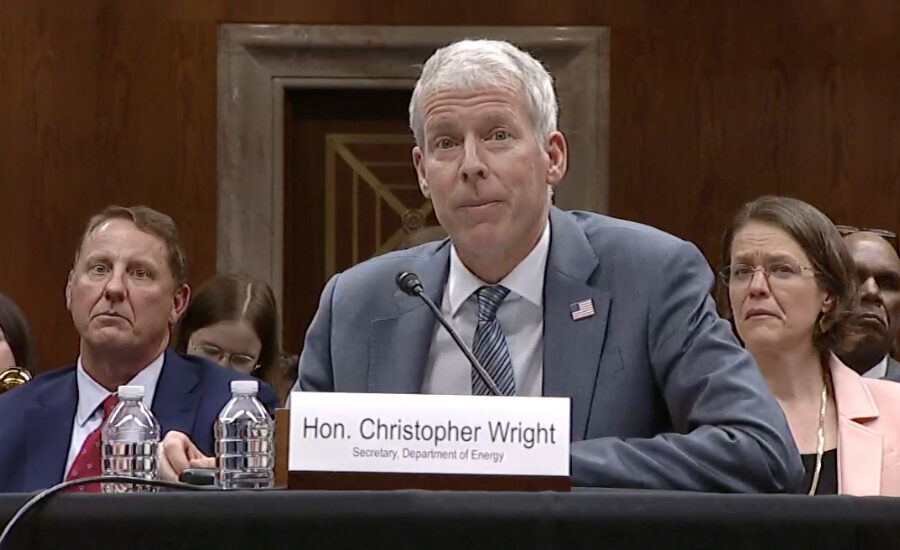
EPA, Energy Heads Lay Out Spending Plans With Major Cuts
[ad_1]

The Trump administration has proposed cutting U.S. Dept. of Energy base discretionary funding by 9.4% and that of the U.S. Environmental Protection Agency’s by 54.5%. With planned cuts totaling billions of dollars, the two agency chiefs outlined their priorities during a pair of congressional hearings May 21.
Energy Secretary Christopher Wright said he aims to “unleash a golden era of American energy dominance, strengthen national security and lead the world in energy innovation.” The 2026 White House budget request would cut the department budget by $4.7 billion compared to this year.
“The Dept. of Energy will advance these critical missions while cutting red tape, increasing efficiency and unleashing innovation and ensuring we are better stewards of taxpayer dollars,” Wright said.
Planned cuts include $15.2 billion in unobligated funds from the Infrastructure Investment and Jobs Act to various renewable energy, carbon dioxide emissions, electric vehicle and battery storage programs. Another $2.6 billion would be cut from energy efficiency and renewable energy programs to reorient them away from climate change and environmental justice focus, and $1.1 billion would be eliminated from climate change-related research.
The budget proposal also targets additional research funds, the federal program managing cleanup sites and other areas. The reduced budget will enable Energy to return “to its core mission of advancing energy innovation and global competitiveness through research and development,” Wright said.
Sen. John Kennedy (R-La.), chair of the Senate energy and water development subcommittee, praised the planned cuts, saying that department spending “is unsustainable.” Its budget climbed from $61 billion in 2021 to $160 billion this year.
“That’s pretty dramatic,” he said. “And I know your skinny budget is addressing some of that. I hope we can address the spending with a scalpel, not a meat ax. But we’re going to have to address it.”
Other lawmakers expressed concern about the level of cuts. Sen. Patty Murray (D-Wash.), ranking member on the subcommittee, called the spending plan “completely inadequate.” She and other members questioned Wright about canceled grants, unpaid invoices and staff buyouts and firings.
“We must give the programs DOE manages their due in terms of funding and in terms of oversight necessary to make sure that funding actually gets to our communities,” Murray said. “But I believe those goals are in jeopardy because of some of your actions over the last few months, like a truly sweeping funding freeze, unprecedented contract cancellations, mass staffing reductions and uncertainty that is hurting communities across our country.”
EPA Cuts
The budget proposal would cut $5 billion from EPA. Administrator Lee Zeldin highlighted its work completing a cleanup after the Los Angeles wildfires, addressing PFAS contamination, advancing redevelopment at 21 Superfund sites and completing 25 State Implementation Plans. He said the agency is making moves to reduce regulatory costs.
The White House budget request for EPA calls for nearly $2.5 billion to be cut from the clean and drinking water state revolving loan funds, $1 billion from EPA’s categorical grant programs, $254 million from the Superfund program and $235 million from the Office of Research and Development.
“By reducing EPA’s budget by billions of dollars, the president’s fiscal year 2026 budget demands maximum efficiency … while we continue to fulfill all of our statutory obligations,” Zeldin said.
However, senators on the committee raised concerns about the extent of the cuts and about grant funding that EPA has terminated. Questioning between some Democrats and Zeldin turned argumentative at times as they asked about canceled grant awards, the agency’s move to terminate the Greenhouse Gas Reduction Fund and reorganization within EPA research offices.
“EPA’s actions have made families worse off, ignored science and eroded America’s trust in your agency—and all for the benefit of polluters,” said Sen. Sheldon Whitehouse (D-R.I), ranking member on the Senate environment and public works committee. “The ongoing destruction at EPA violates legal contracts, violates the Constitution, violates the rule of law and flouts many court orders.”
Even some Republicans shared reservations about the extent of the cuts while voicing support for the agency’s moves to rescind Biden-era regulations. Sen. Shelley Moore Capito (R-W.Va.), chair of the environment and public works committee, said EPA “restored accountability to grant programs” but added that nonpartisan programs to help ensure clean air, water and lands would be impacted by the proposed budget if enacted, including an 89% cut to the clean and drinking water State Revolving Funds, which put money toward infrastructure projects.
“I and many of my colleagues have long been vocal about the importance of federal assistance for water infrastructure through the State Revolving Funds,” Capito said.
House lawmakers passed their spending and tax reconciliation package this week. Senate Republicans aim to finish theirs to send to the president by July 4.
[ad_2]
Source link
Post a Comment
You must be logged in to post a comment.






